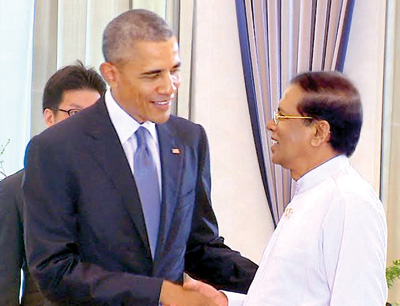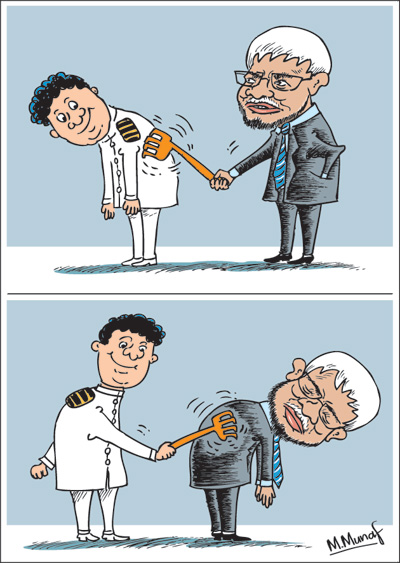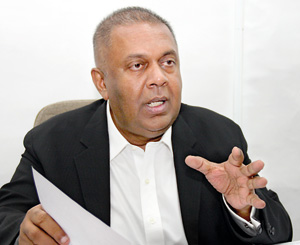Columns
Corruption probes: President mindful of impact of grilling public officials
- Widespread concern over delays and failures to act against alleged plunderers but Sirisena concerned about administrative issues
- Lankan leader gets international recognition that Sajin Vaas could not buy for Rajapaksa at the cost of millions of dollars
- Moves to win over ten more SLFP dissidents — with perks and privileges provided; Govt. determined to defeat no-faith move against Ravi
It may have been bacon and eggs for breakfast for most G-7 leaders who attended their 43rd summit in Japan last week, but for President Maithripala Sirisena it was just a simple meal of boiled Batala (sweet potatoes) and Lunumiris (ground dried chillies and onion with salt and lime).
He ate that at pre-dawn before being driven to the summit venue in Ise-Shima in a three-and-half-hour-road journey. It was only the G-7 leaders who stayed at Shima Kanko Hotel in Ise Shima. This is some distance away to Hiroshima where a United States Air Force B-29 bomber dropped ‘Little Boy’, the devastating atom bomb, in August 1945.

US President Barack Obama warmly greets President Sirisena saying “Well done, we are there to help you.”
For Sirisena, who was staying at the Nagoya Hilton, there was also rice and curry for lunch. He had a Sri Lankan choice for dinner too – string hoppers, pittu, kiri hodi and ala thel daala or potatoes tempered with onions and dried chillie pieces. The food came from owners of two different Sri Lankan restaurants in Japan – Hantane Hotel and Sigiriya Hotel. A well-wisher known to Sirisena was in Colombo before he departed. He had taken along with him fish ambulthiyal, ambarella and polos curries. They were served too.
The drive from Nagoya, the home city for Toyota, to Ise Shima was a lesson in how the Japanese observed traffic laws, from the highest to the lowest, in the land of the rising sun. President Sirisena’s motorcade stopped at traffic lights and his personal security detail never ignored them nor forced their way ahead like it happens to VIPs and their showpiece escorts in Sri Lanka. Instead, they only took one precaution. Two from the Japanese personal security detail stepped out of their vehicle and stood guard just outside the rear doors of the Sri Lankan President’s vehicle. When the signal lights turned green, they jumped back into their vehicle and the motorcade moved on.
One afternoon President Sirisena came down to the coffee shop at the Nagoya Hilton to have tea with a few members of his entourage. What gave the shivers to his Japanese personal security officers was when Sirisena decided to go shopping. He asked two of his Sri Lankan bodyguards and two of their Japanese counterparts to accompany him. He walked from the hotel to a toy shop to buy gifts for his grandchild. Word soon spread and a retinue of nervous Japanese bodyguards descended on the area.
The arrival ceremonies for the G-7 summit and related events were at Nagoya International Airport. Some leaders came in their own aircraft or chartered flights. It was easy to receive them after laying the red carpet on the parking apron all the way to the step ladder. However, Sirisena was on a scheduled Singapore Airlines flight. He had waited at Singapore’s Changi airport for four and half hours to board the connecting flight. Officials who were on hand to receive him in Nagoya did not want the flight with a full complement of passengers to first taxi to a reception area and then later move to disembark others. They were conscious of the inconvenience that it would cause. Instead, they laid the red carpet up to the passenger boarding bridge. Whilst the passengers walked into the terminal building, Sirisena was to use the mechanical step ladder attached to the boarding bridge, usually used by maintenance crews. He came down the steps to set foot on the red carpet and be welcomed.
 In Ise Shima, there was a gathering of the G-7 leaders together with other Presidents and Government leaders who were invited. “Well done Sri Lanka. We are there to help you. We are watching your progress with happiness,” declared US President Barrack Obama as he shook Sirisena’s hands. A smiling Japanese Prime Minister Shinzo Abe, who played host, looked on.
In Ise Shima, there was a gathering of the G-7 leaders together with other Presidents and Government leaders who were invited. “Well done Sri Lanka. We are there to help you. We are watching your progress with happiness,” declared US President Barrack Obama as he shook Sirisena’s hands. A smiling Japanese Prime Minister Shinzo Abe, who played host, looked on.
British Prime Minister David Cameron who greeted Sirisena remembered what they discussed when he (Sirisena) attended the Anti-Corruption Summit in London just a week before. Cameron said his Government was working on Sri Lanka’s request to probe the assets of those in the previous Sri Lankan administration. Canadian Prime Minister Justin Trudeau also greeted him.
Those three days in Japan won for Sirisena the international exposure and an image which the former controversial External Affairs Ministry Monitoring MP Sajin de Vass Gunawardena could not buy for US dollars for the then President, Mahinda Rajapaksa. This was after Vaas Gunawardena poured millions of dollars of the taxpayer’s money to US based public relations companies, all of them without any form of approval from the Cabinet of Ministers. They were paid out directly by the Central Bank of Sri Lanka though no investigations have yet begun into this colossal waste of funds and Vass Gunawardena has become a strong backer of Sirisena.
Domestic challenges
With an enhanced international stature Sirisena returned to Colombo to face a variety of domestic issues. They were challenging enough for him. One of the decisive issues is the much publicised campaign by Government leaders during presidential and parliamentary polls – to launch a relentless battle against bribery, corruption and other malpractices during the previous Rajapaksa administration. Ahead of his departure, Sirisena summoned the Financial Crimes Investigation Division (FCID) chief, Senior DIG Ravi Waidyalankara, on May 25 to tell him not to initiate any action against a particular set of officials until he returned from Japan. After his return, Sirisena met Waidyalankara again on Thursday (June 2) and urged him not to arrest Government officials over alleged offences. In another case, he also directed that only a former Minister could be arrested in accordance with the AG’s Department ruling since investigations had been concluded but not an official associated with him over alleged abuse of public funds. The limited move appears to have been prompted by concerns in the top rungs of the administrative service.
Senior administrative officers held the view that they would be reluctant to carry out instructions of political leaders including ministers unless they received them in writing. This was because they would become accountable to a future Government. Some even said they cannot face the FCID. The same position had been taken by some district level officials who were involved in flood relief work recently. They had cited reference to what seemed a circular issued after an earlier natural disaster. This had declared that assistance should be confined only to those who are in welfare centres. However, this was overcome.
The FCID had, acting on the instructions of the Attorney General’s Department, prepared to arrest the Tourism Promotion Authority’s directors who had functioned under the previous Government. This was on allegations over misappropriation of public funds for the presidential election campaign in January 2015. The AG’s Department was to file indictments against them under the Public Property Act. Those to be arrested over these allegations were Bashwara Senanka Gunarathne (then Chairman), D.S. Jayarathne (then Director General), Hema Dharmawardena (Director and presently working as an Additional Secretary in the Prime Minister’s office), R. Semasinghe (then Director and presently working in the Treasury as a Director General), Don Chandrasiri (then Director) and Kithsiri Ranawaka (then Director). Those involved have taken up the position that they simply acted on instructions given to them by the political leadership at the time and did not misappropriate the funds. The FCID had conducted investigations on six alleged financial frauds totalling Rs. 114 million that had reportedly taken place in the Tourism Promotion Authority, which also once organised a controversial Indian film star award ceremony, IIFA, in Colombo. The planned arrest was reportedly over one case.
In the past several days, state investigation agencies had redoubled their efforts to deal with acts of bribery, corruption and other malpractices. This was amid public complaints that despite pledges made, action against those allegedly involved have slowed down, some due to political and ‘economic’ pressure. However, this development comes in the backdrop of the Anti-Corruption Committee Secretariat’s (ACCS) extended term coming to a close on June 30. Unless its mandate is extended, it will cease to exist. It was this Secretariat which received public complaints of bribery, corruption, money laundering and a variety of other malpractices. After study, they were directed to the relevant state agencies. That included the Criminal Investigation Department (CID), Financial Crimes Investigation Division (FCID), the Commission to Investigate Allegations of Bribery or Corruption and even the Department of Inland Revenue. The Secretariat was set up after the presidential election in 2015. Its tenure, which was for one year was to expire on December 31 and was extended by six months to June 30.
The setting up of the Secretariat “to investigate large scale corruption and fraudulent activity during the previous regime and initiate legal action against those responsible…” came on a Cabinet Memorandum dated February 6, 2015 submitted by Prime Minister Ranil Wickremesinghe. The same memo led to the establishment of the FCID “under the direct supervision of the Inspector General of Police…”
Challenges within SLFP
President Sirisena has also taken the personal initiative to speak particularly to Sri Lanka Freedom Party (SLFP) parliamentarians over Tuesday’s vote of no-confidence against Finance Minister Ravi Karunanayake. This is to ensure that they counter allegations, which he feels are directed at his Government, and to vote against it. “I will not be deterred by such motions. I am an elected representative of the people and will continue to serve them,” Karunanayake told the Sunday Times defiantly this week. Also backing the Finance Minister strongly is Prime Minister Wickremesinghe who had made clear that all UNP MPs should be present in Parliament to defeat the motion.
An even more challenging ongoing task for Sirisena is his efforts to win over the complete leadership of the Sri Lanka Freedom Party (SLFP). He has to politically ensure Rajapaksa and his allies do not re-emerge and at the same time gear his party to win a future election, particularly the local authority elections. The polls were postponed ostensibly on the grounds that the Delimitation Commission had not finished its work, but it is more likely that the Sirisena faction was uncertain of victory. At present a sizeable faction of the SLFP is extending support to former President Mahinda Rajapaksa. On the other hand, there was widespread speculation this week that a group of around ten SLFP MPs may extend support to Sirisena. Some are being touted as would be recipients of official positions. All those ‘crossing over’ would also be recipients of perks including vehicles, a source familiar with the dialogue said.
Arjuna Mahendran issue
President Sirisena is also expected to have a key meeting in the coming week with Prime Minister Wickremesinghe. Among matters to be discussed, a Government source said yesterday, would be an extended term for Central Bank Governor Arjuna Mahendran. His tenure of office comes to a close on June 30 having taken only the remaining term of his predecessor Nivaard Cabral who resigned in January 2015 following the Presidential election. Premier Wickremesinghe is strongly in favour of an extension for Mahendran. In the SLFP, an influential section has said that Mahendran’s term should not be extended. Civil society organisations have sought a meeting with President Sirisena to make a similar request. Last Thursday, National Freedom Front (NFF) leader Wimal Weerawansa alleged at a news conference that the Central Bank Governor had used his official credit card lavishly for personal purchases – a charge which Mahendran has denied.
On the international front, as revealed exclusively in these columns last week, Sirisena’s decision to allow only local judges to investigate alleged war crimes in accordance with the Geneva based UN Human Rights Council Resolution (co-sponsored by the US and Sri Lanka) was articulated to the military last week by Prime Minister Wickremesinghe. He told over a 100 senior Army officers that the inquiry mechanism would comprise only local judges. Premier Wickremesinghe told the Sunday Times that charges before the inquiry mechanism would be served individually and not collectively. He was explaining a question raised by the Army Commander when the premier met the military top brass. The charges will be served on troops as well as Tiger guerrillas. Further elaboration on related issues came during a brief Q & A with Foreign Minister Mangala Samaraweera. See box story on this page.
After one-and-a-half years in office, President Sirisena has won wide international acceptance, mainly from the Western powers for himself and thus Sri Lanka. There is little doubt he would expect all segments in the Government to back him in the challenges he faces. Coalitions by any other name are cauldrons of chaos and confusion. Different stakeholders, with different agendas can sometimes work at cross purposes. Herein lies the key issue.
| Before and after Geneva: Mangala explains what will happen Foreign Minister Mangala Samaraweera spoke to the Sunday Times on issues for Sri Lanka before the 32nd UN Human Rights Council sessions which begin next week in Geneva. Here are highlights:MEASURES THE GOVERNMENT HAS ADOPTED SINCE THE-US BACKED RESOLUTION CO-SPONSORED BY SRI LANKA: The Resolution 30/1 of 1 October, last year contained mainly what the Government had already undertaken to do as enumerated in my statement to the Human Rights Council on September 14, 2015. This is why Sri Lanka co-sponsored the Resolution. These are commitments to our own people — to address their problems and empower them and, as President Sirisena has explained including on May 1, 2016, to make Sri Lanka a modern democracy and a model nation.  Foreign Minister Mangala Samaraweera The Government’s initiatives to strengthen, promote and protect human rights, good governance, and the rule of law had begun in fact even before the resolution was adopted and the Government continues these efforts. The steps taken are too vast to enumerate. A few issues linked directly to the matters addressed in the resolution include holding public consultations, for the first time in the country that will inform the design of reconciliation mechanisms. A civil society led Task Force has been established for this purpose. Sri Lanka is now a party to the International Convention for the Protection of All Persons from Enforced Disappearance. This is a measure that is aimed at ensuring that in future, the Sri Lankan people who had in past decades faced the trauma of disappearances, will not have to face similar trauma. The Cabinet of Ministers approved the setting up of a permanent Office on Missing Persons based on the humanitarian basis of the family’s right to know and this Office will, among other matters, endeavor to trace the fate of the missing. The Bill has now been Gazetted in Sinhala, Tamil and English and can be accessed by all at http://www.documents.gov.lk/en/bills.php INVESTIGATIONS OF ALLEGED WAR CRIMES WITH LOCAL JUDGES: HOW THE MECHANISM WOULD WORK AND HOW THOSE FACING ALLEGATIONS WILL BE CHARGED: THE PROPOSED CONSTITUTION HAVING PROVISIONS TO ADDRESS TAMIL ISSUES CONSEQUENT TO THE RESOLUTION: He said that we have to reflect on our experiences in the past and our failures; the bloodshed in the country that left no one untouched, in the north and the south and act with wisdom and take steps not to repeat the past and not let opportunities slip by as we had done in the past. He said that we should not create constitutional scaremongering when talking about the Constitution drafting process, and that we should focus on creating a Constitution that will be in line with the vision of a modern Sri Lankan state where every individual’s rights will be protected and upheld, and every individual will be treated with dignity. THE TRUTH AND RECONCILIATION COMMISSION: WHETHER THE JUDGES HAVE ALREADY BEEN SELECTED: MESSAGE TO THE INTERNATIONAL COMMUNITY: | |


Leave a Reply
Post Comment